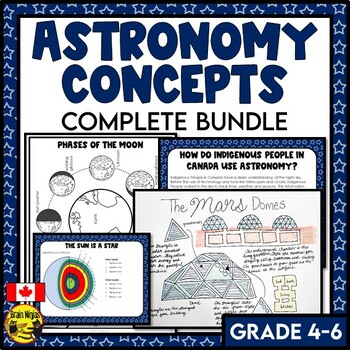Astronomy Lesson and Activity Bundle | Space Unit | Sky Science
- Zip

What educators are saying
Products in this Bundle (11)
showing 1-5 of 11 products
Description
Learn the basics of the universe, Solar System, Phases of the Moon, eclipses, stars, constellations, and how astronomy has been used by different cultures with these activities that only take minutes to prepare. Everything you need to teach these concepts is included, along with background knowledge in case you're new to teaching space or astronomy.
This engaging resource includes:
- complete lesson plans with suggestions for differentiation.
- student pages and templates.
- answer keys and suggested answers. Photographs of some of the projects are included.
- opportunities to extend learning.
- Canadian spellings and metric measurements. This includes SI Notation on numbers (so 39 000 instead of 39,000)
- ideas for how to use this resource in the classroom, online, or a mix.
- digital versions of all the student pages that use Google Slides. You must download the PDF file and use the access link in the file to get your digital copy of each resource.
The resources in this bundle are:
- an overview style space unit: astronomy and astrology (scientific and unscientific statements), how astronomy has been used by different cultures throughout history, light-emitting and reflecting, objects in the Universe, objects in the Solar System, stars, astronomy and time (day/night, seasons).
Solar System Collaborative Poster
- a poster that shows the planets in the Solar System and includes an activity about other objects in the Solar System.
- the Moon: size, composition, and interesting facts.
- Phases of the Moon, including Indigenous names for full moons.
- Spring Tides and Neap Tides. Information about diurnal and semi-diurnal tide cycles is included in a reading passage about tides and how the Moon, Sun, and Earth affect tide cycles.
- the topics of the umbra and penumbra; lunar eclipses: total, partial and penumbral; solar eclipses: total, annular, partial, and hybrid.
- stars, characteristics of stars, life cycles of stars, and constellations
- life cycle of stars including stages: stellar nebula, main sequence massive star, main sequence average star, black dwarf, white dwarf, planetary nebular, red supergiant, neutron star, red giant, black hole, supernova
- common constellations
- stories about constellations
- how auroras (aurorae) are created in the sky; the various names and reasons for names including Aurora Polaris, Aurora Borealis, Aurora Australis, Polar Lights, Southern Lights and Northern Lights; stories told by Indigenous People in Canada related to the lights.
Surviving Space STEM Challenges
- fifteen open-ended challenges where students solve problems faced by space travel and exploration with suggestions to extend learning. These come in two formats (one for the teacher and a simpler one for students).
- this product is not digital as students are expected to work hands-on
Should We Explore Space? Perspective Activities
- activities to learn about how different viewpoints are formed.
- activities to address facts and opinions, bias, pro/con arguments, and finding quotes in support of viewpoint.
- activities to learn to form an opinion based on information.
- a link to Google Slides with 25 questions linked directly to their answers.
- student answer recording page.
- questions about stars, phases of the moon, eclipses, planets, and other celestial bodies.
- ten reading passages designed for Grade Six reading level (though we understand that not all students read at the exact level).
- topics such as The Universe, Our Solar System, Moons, Earth's Moon, Planets, Stars, Constellations, Day and Night, Seasons, and Space History.
- paper and digital versions are included for each text. The digital version has loose text, so it can be read by text-to-speech readers.
- simple suggestions to use the text sets.
- the list of words can be found in the preview
- comes with an editable page so you can add your own words to the set
Please see the preview for more information.
These lessons align with:
- the Alberta Program of Studies for Grade 6 Sky Science (old outcomes)
- some of these resources have been realigned to match the new Alberta Science outcomes, but we have made new units to align better (see below)
These lessons support:
- any astronomy or space unit.
Do you teach science in Alberta? We have science units for you!
- Learn how we're adjusting resources to align with the new science curriculum in Alberta.
- Space Unit Grade 4
- Space Unit Grade 5
- Space Unit Grade 6 (COMING SOON!)
- Alberta Science Full Year Bundle Grade 4 (COMING SOON!)
- Alberta Science Full Year Bundle Grade 5 (COMING SOON!)
- Alberta Science Full Year Bundle Grade 6 (COMING SOON!)
FOLLOW US TO GET THE LATEST!
Please let us know how this resource works for you by rating it or providing comments. You'll get TpT credits to use toward future purchases.
Find us on social media: Instagram, Facebook or our website.
Thank you for your consideration! Happy learning about space from the Brain Ninjas!





